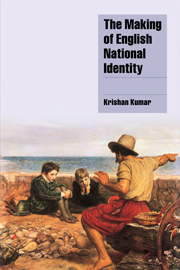Book contents
- Frontmatter
- Contents
- Preface
- 1 English or British? The question of English national identity
- 2 Nations and nationalism: civic, ethnic and imperial
- 3 When was England?
- 4 The first English Empire
- 5 The English nation: parent of nationalism?
- 6 The making of British identity
- 7 The moment of Englishness
- 8 The English and the British today
- Notes
- List of references
- Index
- Cambridge Cultural Social Studies
8 - The English and the British today
Published online by Cambridge University Press: 07 December 2009
- Frontmatter
- Contents
- Preface
- 1 English or British? The question of English national identity
- 2 Nations and nationalism: civic, ethnic and imperial
- 3 When was England?
- 4 The first English Empire
- 5 The English nation: parent of nationalism?
- 6 The making of British identity
- 7 The moment of Englishness
- 8 The English and the British today
- Notes
- List of references
- Index
- Cambridge Cultural Social Studies
Summary
The British nation and the British state are clearly entering a process of dissolution, into Europe, or the mid-Atlantic, or a post-imperial fog. Britain has begun its long march out of history.
Gwyn Williams (1982: 190)Who knows what vigour Englishness might exhibit if for the first time in many centuries the English find themselves speaking for only England?
Paul Langford (2000: 319)For many people, members of minorities and of the majority alike, the existing images of Britishness do not embrace the new mix of cultures and communities that exist today. We need to reform and renew conceptions of Britishness so that the new multiculturalism has a place within them.
Tariq Modood et al. (1997: 359)I think it is a great Error to count upon the Genius of a Nation as a standing argument in all Ages; since there is hardly a spot of ground in Europe, where the Inhabitants have not frequently and entirely changed their Temper and Genius.
Jonathan Swift (in MacDougall 1982: 77)Forever England
In December 1991 Britain signed the Treaty of Maastricht and so committed itself, in principle at least, to a European Union. The move caused consternation in several quarters, not least among Tory supporters but also among ‘Little Englanders’ on the Labour left. It seemed to herald the loss of British parliamentary sovereignty and the end of British independence. At the Conservative Party conference in the following year the then prime minister, John Major, sought to reassure the Tory disaffected.
- Type
- Chapter
- Information
- The Making of English National Identity , pp. 226 - 273Publisher: Cambridge University PressPrint publication year: 2003

